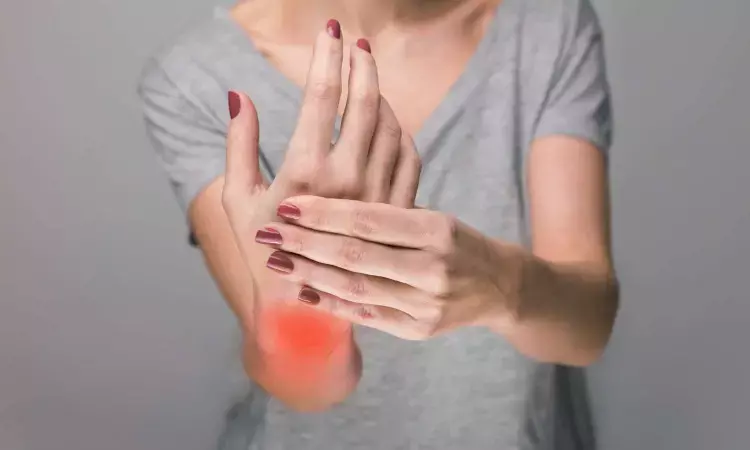- Home
- Medical news & Guidelines
- Anesthesiology
- Cardiology and CTVS
- Critical Care
- Dentistry
- Dermatology
- Diabetes and Endocrinology
- ENT
- Gastroenterology
- Medicine
- Nephrology
- Neurology
- Obstretics-Gynaecology
- Oncology
- Ophthalmology
- Orthopaedics
- Pediatrics-Neonatology
- Psychiatry
- Pulmonology
- Radiology
- Surgery
- Urology
- Laboratory Medicine
- Diet
- Nursing
- Paramedical
- Physiotherapy
- Health news
- Fact Check
- Bone Health Fact Check
- Brain Health Fact Check
- Cancer Related Fact Check
- Child Care Fact Check
- Dental and oral health fact check
- Diabetes and metabolic health fact check
- Diet and Nutrition Fact Check
- Eye and ENT Care Fact Check
- Fitness fact check
- Gut health fact check
- Heart health fact check
- Kidney health fact check
- Medical education fact check
- Men's health fact check
- Respiratory fact check
- Skin and hair care fact check
- Vaccine and Immunization fact check
- Women's health fact check
- AYUSH
- State News
- Andaman and Nicobar Islands
- Andhra Pradesh
- Arunachal Pradesh
- Assam
- Bihar
- Chandigarh
- Chattisgarh
- Dadra and Nagar Haveli
- Daman and Diu
- Delhi
- Goa
- Gujarat
- Haryana
- Himachal Pradesh
- Jammu & Kashmir
- Jharkhand
- Karnataka
- Kerala
- Ladakh
- Lakshadweep
- Madhya Pradesh
- Maharashtra
- Manipur
- Meghalaya
- Mizoram
- Nagaland
- Odisha
- Puducherry
- Punjab
- Rajasthan
- Sikkim
- Tamil Nadu
- Telangana
- Tripura
- Uttar Pradesh
- Uttrakhand
- West Bengal
- Medical Education
- Industry
New class of disease-modifying drugs promising for patients with hand osteoarthritis

UK: Talarozole, a retinoic acid metabolism blocking agent (RAMBA), has an acceptable safety profile in human subjects; a small proof of concept clinical study is in the process to see whether this drug represents a new disease-modifying treatment in patients with hand osteoarthritis, a recent study stated.
Hand osteoarthritis is a common and debilitating medical condition that affects mainly women, especially around menopause. Currently, no disease-modifying treatments effectively relieve symptoms or stop deformity and stiffness of the joints.
The researchers investigated a common gene variant linked to severe hand OA. Using patient samples collected at the time of routine hand surgery and several experimental models, they could identify a key molecule that was especially low in 'at risk' individuals, called retinoic acid.
Professor Tonia Vincent, Professor of Musculoskeletal Biology & Honorary Rheumatologist at Oxford's Nuffield Department of Orthopaedics, Rheumatology and Musculoskeletal Sciences (NDORMS), said: 'This project was only possible because of our multi-disciplinary approach; working with our hand surgical colleagues, geneticists, data scientists and biologists.'
Dr Neha Issar-Brown, Director of Research and Health Intelligence at the charity Versus Arthritis, which funded the research, said: 'Around 8.5 million people in the UK live with OA. Despite often being dismissed as just a few aches and pains, OA can have a profound and far-reaching impact on life, affecting people's ability to work, care for a family, or live independently.
'There is an urgent need for disease-modifying treatments designed to prevent or reverse the painful symptoms of OA. This study reveals a new understanding of the causes of hand osteoarthritis, which could lead to identifying new biological targets for intervention in hand OA.
'This research is still at an early stage, but with these encouraging findings we are a big step closer in being able to develop a new class of disease-modifying drugs to treat osteoarthritis, prevent chronic pain, and enable people to live well with the condition,' Dr Issar-Brown concludes.
Reference:
View ORCID ProfileLinyi Zhu, Pragash Kamalathevan, Lada Koneva, Jadwiga Miotla Zarebska, Anastasios Chanalaris, Heba Ismail, Akira Wiberg, Michael Ng, Hayat Muhammed, Fiona E. Watt, The Oxford Hand Surgical Team, Stephen Sansom, View ORCID ProfileDominic Furniss, Matthew D. Gardiner, Tonia L. Vincent doi: https://doi.org/10.1101/2021.09.10.457848
Dr Kamal Kant Kohli-MBBS, DTCD- a chest specialist with more than 30 years of practice and a flair for writing clinical articles, Dr Kamal Kant Kohli joined Medical Dialogues as a Chief Editor of Medical News. Besides writing articles, as an editor, he proofreads and verifies all the medical content published on Medical Dialogues including those coming from journals, studies,medical conferences,guidelines etc. Email: drkohli@medicaldialogues.in. Contact no. 011-43720751


